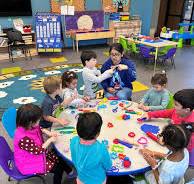The Importance of Preschool Education
Preschool, often known as nursery school or pre-kindergarten, plays a crucial role in a child’s early development. It serves as a foundation for future learning and sets the stage for academic success. Here are some key reasons why preschool education is so important:
Socialization Skills
Preschool provides children with the opportunity to interact with their peers and develop essential social skills. They learn how to share, communicate, and collaborate with others, setting the groundwork for healthy relationships in the future.
Cognitive Development
Through engaging activities and structured play, preschool helps children develop cognitive skills such as problem-solving, critical thinking, and decision-making. These skills are essential for academic achievement later in life.
Emotional Growth
Preschool offers a nurturing environment where children can learn to express their emotions, understand their feelings, and develop empathy towards others. This emotional intelligence is vital for building resilience and coping with challenges.
Language and Literacy Skills
In preschool, children are exposed to language-rich environments that stimulate their vocabulary and literacy skills. They learn to listen, speak, read, and write – laying the foundation for successful communication and academic progress.
Preparation for Kindergarten
Attending preschool helps children transition smoothly into kindergarten by familiarizing them with school routines, structure, and expectations. It reduces anxiety about starting formal education and boosts confidence in their abilities.
In conclusion, preschool education is not just about playtime; it’s a critical period in a child’s development that shapes their future success. By investing in high-quality preschool programs, we can give every child the best possible start in life.
Understanding Preschool: Costs and Age Requirements Across Different States
- Is preschool free in Washington state?
- What age is Pre-K in Texas?
- Is there free preschool in Arizona?
- Is pre-K free in California?
- What age is pre-K in NJ?
- What is a preschool age?
Is preschool free in Washington state?
In Washington state, preschool options vary in terms of cost and availability. While there are some publicly funded preschool programs that offer free or low-cost options for eligible families, not all preschools in the state are free. Families may also choose to enroll their children in private preschools, which typically require tuition fees. It is recommended for parents to research and inquire about the specific preschool programs available in their area to determine the cost and financial assistance options that may be available to them.
What age is Pre-K in Texas?
In Texas, Pre-K, also known as pre-kindergarten, is typically available for children who are four years old by September 1st of the current school year. This means that children who turn four on or before September 1st are eligible to enroll in Pre-K programs in Texas. Pre-K serves as an important stepping stone for children before they enter kindergarten, providing them with valuable early learning experiences and preparing them for success in their academic journey.
Is there free preschool in Arizona?
In Arizona, free preschool options are available through various state and federally funded programs, as well as through some public school districts that offer pre-kindergarten programs at no cost to eligible families. Programs such as Head Start and the Arizona Early Education Program (AzEIP) provide free or low-cost preschool services to children from low-income families or those with special needs. Additionally, some school districts in Arizona may offer tuition-free preschool for children within their boundaries. Families interested in accessing free preschool options in Arizona are encouraged to explore these programs and reach out to local schools and community organizations for more information on eligibility criteria and enrollment procedures.
Is pre-K free in California?
In California, pre-K programs, also known as transitional kindergarten (TK) or preschool for 4-year-olds, are not universally free for all children. While some public schools and districts may offer free or subsidized pre-K options based on income eligibility or other criteria, the availability and cost of pre-K programs can vary depending on the location and provider. Families are encouraged to research local resources, such as public schools, Head Start programs, and community-based organizations, to inquire about affordable pre-K options and financial assistance that may be available to them.
What age is pre-K in NJ?
In New Jersey, pre-K programs typically serve children who are four years old by October 1st of the school year. This means that children enrolled in pre-K in NJ are usually around the age of four, with their birthdays falling before the specified date to be eligible for the program. Pre-K education in New Jersey aims to provide early learning opportunities to children at a crucial stage of their development, setting a strong foundation for their future academic success and overall growth.
What is a preschool age?
Preschool age typically refers to the period between three and five years old, before a child begins formal schooling. During this developmental stage, children experience significant growth in their cognitive, social, emotional, and physical abilities. Preschool programs are designed to cater to the specific needs of children in this age group, providing them with opportunities for learning through play, exploration, and structured activities that lay the foundation for future academic success. By engaging with peers and educators in a nurturing environment, preschool-age children develop essential skills that prepare them for kindergarten and beyond.

